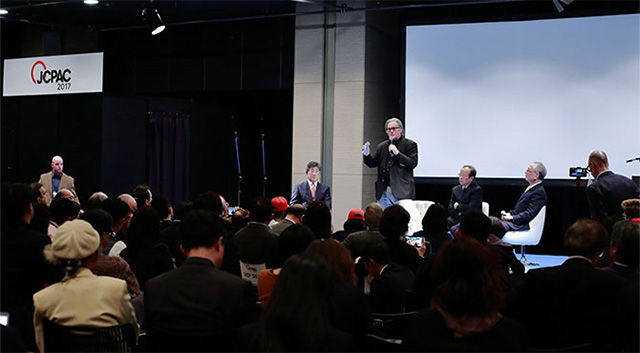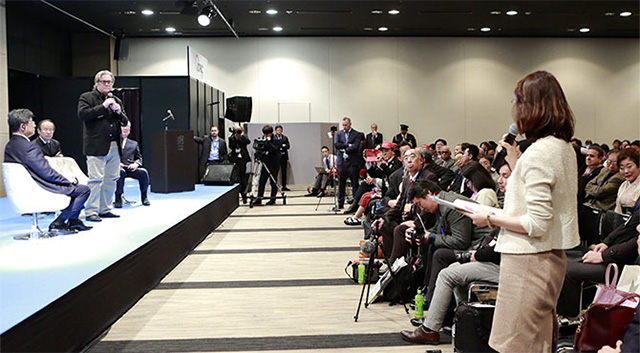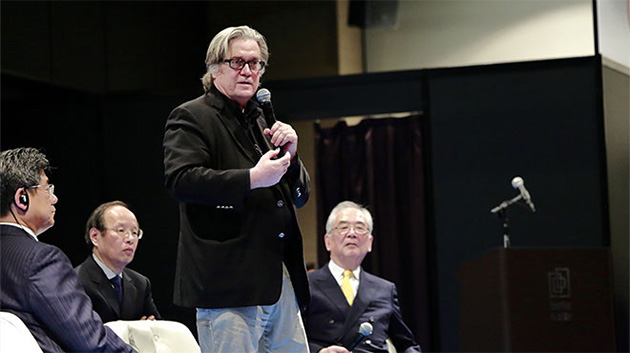U.S.-Japan Partnership Can Stop China’s Menace Says Bannon
Key points in this article:
- Trump’s new security strategy considers China a strategic competitor
- U.S.-Japan prosperity partnership in competition with China can help avoid the Thucydides Trap
- The truth of Trump’s miraculous achievements that mainstream media have ignored
Former White House Chief Strategist and current Executive Chairman of Breitbart News, Stephen K. Bannon, made an appearance at a J-CPAC event in Japan. The event hosted by The American Conservative Union was held on the 16th and 17th where guest speakers are invited to give keynote addresses and participate in panel discussions.
The event covered areas that the Japanese media refuses to touch upon, such as the idea of God’s view in politics and a positive assessment of the Trump administration.
Other speakers at the J-CPAC event included Matt Schlapp, chairman of The American Conservative Union, and Fox news contributor, Gordon G. Chang.
In his address Schlapp explained the meaning of conservatism. Conservatism has a very simple meaning: each individual has a God-given right. That individual can cooperate with others to create a government. In short, sovereignty rests with the individual and not the government. In other words, we are each the masters of our own country, and the government should only have a small role to play. Thus Schlapp explained the central idea of conservatism.
Bannon followed with his own address. He is one of very few Asian politics specialists who has always warned of China’s growing menace. “Half of my job will be on the China problem”, explained Bannon to White House journalist Keith Koffler for his book, “Bannon Always the Rebel”.
Trump’s New Security Strategy
On the 18th after the J-CPAC event, the Trump government announced its new security strategy, which will become the next diplomatic and security policy for the U.S. It explicated the Preserve Peace Through Strength idea and labeled both Russia and China (with its provocative military activities in the South China Sea) a “revisionist power”. He also named 5 other problems such as rogue states (China, Russia and North Korea) and cross-border terrorism.
Before this announcement, however, Bannon said at the J-CPAC event that the new security strategy will deem China a ‘strategic competitor’. He anticipated that Trump will use Section 301 of the Trade Act of 1974 to pressure China. “It is a big step for the U.S. to recognize China as a competitor and not a strategic partner,” Gordon G. Chang told The Liberty Magazine.
On the subject of speeches, Bannon saw greater significance in Xi Jinping’s speech at the 19th Congress of China’s Communist Party than Trump’s inauguration address, saying that strengthening partnerships between the U.S. and East Asia were crucial in deterring China’s frightening plan for global dominance.
Bannon said that it is time for the U.S. and its allies to face China’s menace directly. “Now go back and study what happened in other eras [such as] the 1930s, when leaders of the world [and] leaders on the side of freedom appeased people; didn’t face reality; kicked the can down the road. All the easy decisions are decades behind us . . . There’s only tough choices.”

The U.S. Will Stop Being China’s Tributary State
Bannon rightly claimed that until Trump became President, the U.S. has been a tributary state to China.
The U.S. now has a “US$485 billion annual trade deficit with China . . . Essentially, the United States had been turned into Jamestown to China’s Great Britain, and that all the high value-added manufacturing had essentially been taken by China; had been shipped to China, and the United States was really a tributary state sending China raw materials.”
Trump is acting to bring an end to this, said Bannon.
The trade policy was an important factor of the new security strategy. As foreign capital enters the Chinese market, China uses these opportunities to unofficially demand foreign technology to also be transferred to China.
Until now, the U.S. has dealt with this problem through Section 301 of the Trade Act of 1974. If this is used to a further degree, it will prevent US$3.5 quadrillion worth of technology transfer from the U.S. to China.
Avoiding The Thucydides Trap
Bannon continued that the American intelligentsia had mistakenly assumed that if China becomes wealthier they would come to embrace democracy. “Well, the exact opposite has happened. China has become more and more wealthy, and yet it has become more of a mercantilist authoritative system . . . a 25-year strategic holiday”.
Bannon referred to the Thucydides Trap to prevent further mistakes of this sort.
The Thucydides Trap is a term used amongst experts in international politics coined by Harvard professor Graham T. Allison in his book “Destined to War: Can America and China Escape Thucydides Trap?” Essentially, the book discussed the possibility of avoiding a war between China and the U.S.
Thucydides, to which the term refers, was an ancient Greek historian known for his extensive account of the Peloponnesian War. In it he depicts how the supreme state of Sparta felt threatened by the rising state of Athens inducing Sparta to enter into the Peloponnesian War.
The term Thucydides Trap, therefore, refers to the historically proven inevitability of warfare between forces that compete for hegemony.
In his book professor Allison claims that considering the likelihood of war between the current supreme power and the country aiming to become the next supreme power, China and the U.S. should strike a deal to maintain world order: China governs the East and the U.S. governs the West.
This coincides precisely with China’s worldview of the current situation, and forms a striking resemblance to former U.S. Secretary of State Henry Kissinger’s “G2” argument. We must be aware that professor Allison is not only a scholar but an advisor to the U.S. Department of Defence and a successful businessman.
Bannon, however, challenges this view. He states that the inevitability of war between a provoking new power and the old supreme power is not an established route nor are they functions of unbreakable “laws of thermodynamics”.
“It’s not a foregone conclusion that Japan and the United States have to decline and let China rise,” said Bannon. “Japan has every opportunity to seize its destiny, to reestablish its national identity; and in partnership with the United States – a true partnership with the United States – reverse what the elites have allowed to happen.”
In other words, if the U.S. and its partner Japan can pull the world together, we can avoid the historically prevalent Thucydides Trap. For this he urged Japan to aim for greater economic prosperity. It is the people who play a primary role in this, as they are only ones with the power to say ‘no’ to a government that has a vested interest.
Trump’s Miraculous Achievements That the Media Ignores
Bannon also spoke about Trump’s patriotic achievements that the mainstream media choose to ignore.
“Last Friday New York Federal Open Market Committee announced that America’s economic growth for the fourth quarter was 4%. The unemployment rate among Hispanics and Blacks, and overall hit a record low. Worker’s wages are rising in the farming and construction industries and stocks have gone up 33%. 2.2 million people have been newly employed since Trump’s inauguration.
“We achieved economic growth before the tax reduction bill takes effect. But no one reports this. If Obama had achieved the same thing as President Trump, he would have received the Nobel Prize in Economics.”
Bannon said Trump’s economic achievements were miraculous.
There is another miracle, he said, in security. “Mr. Trump said that civilized nations will cooperate to wipe out radical Islam. In 2014 over 8 million people were enslaved by ISIS, but in 10 months since his inauguration ISIS strongholds have all but been destroyed.”
On top of this, on Trump’s visit to the Middle East in May, Sunni Islam countries such as Saudi Arabia agreed to purge radical groups inside their borders, and reform Islam to become more moderate. No other president in history was able to change the Middle East situation so dramatically within 10 months.
U.S.-Japan and How To Deal With China’s Provocations
The Liberty Magazine asked a question to Bannon at the J-CPAC event: “We’re very impressed by your support of Judeo-Christian values. Could you share with us how you came to defend Western values that are imperative to combatting Communism in Asia, such as China?
Bannon answered that the Western values, including democracy and the rule of law, allowed Japan and the U.S. to work together after the war.
“If you talk to people in mainland China, [they say the authorities] knock on your door in the middle of the night and you get taken away to a prison camp, or all your money is confiscated. Those values of freedom and democracy and principally the rule of law is one of the great things the West has worked on for three millennia, and it’s one of the things that will get us through in the future.”

Listening to Bannon’s speech and Trump’s new security strategy, it is clear that the U.S. is working on a strategy to fight against China’s ever-growing hegemony.
Japan must learn from the U.S., follow the path to prosperity to overcome the crisis of our times. Both countries have a monumental role, and the protagonists are the people: those who have submitted to the establishment for too long.
(Hanako Cho)



















